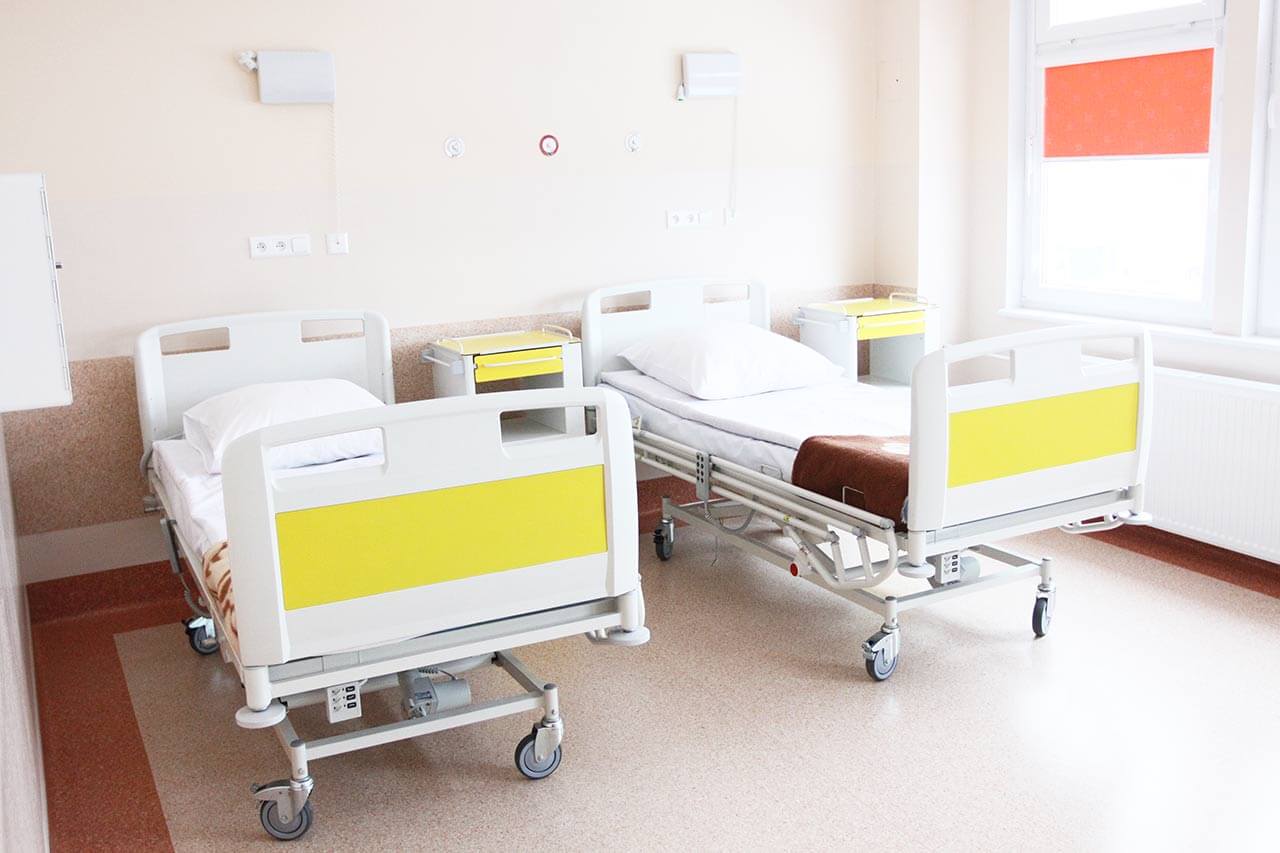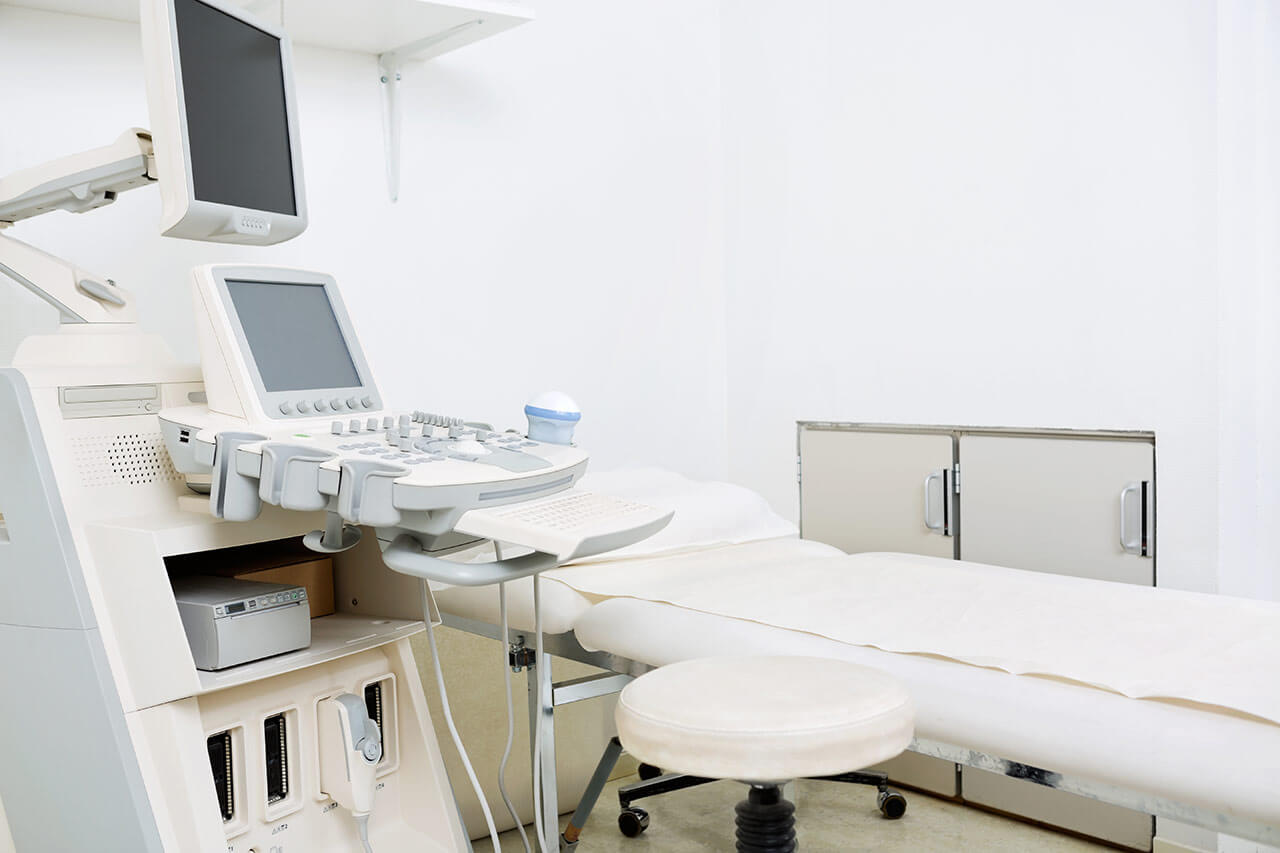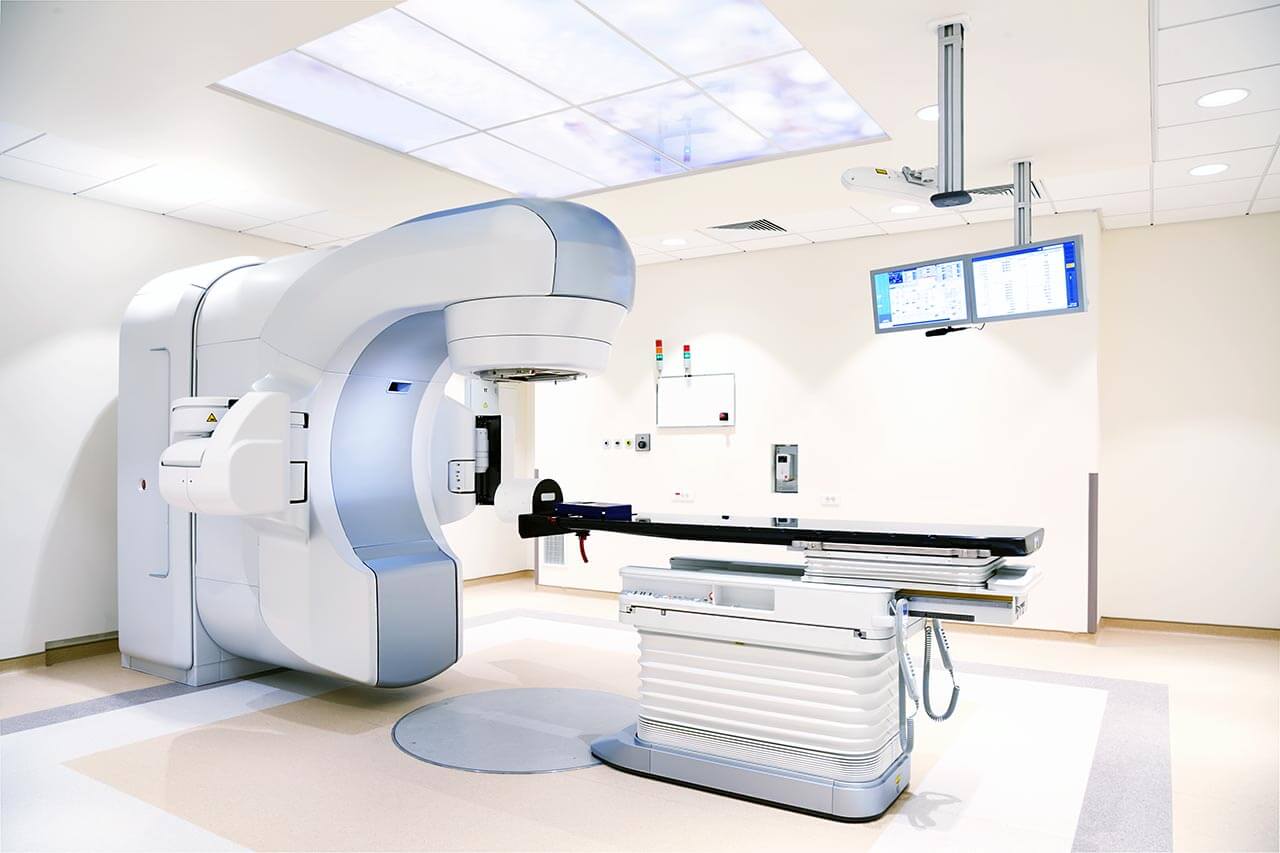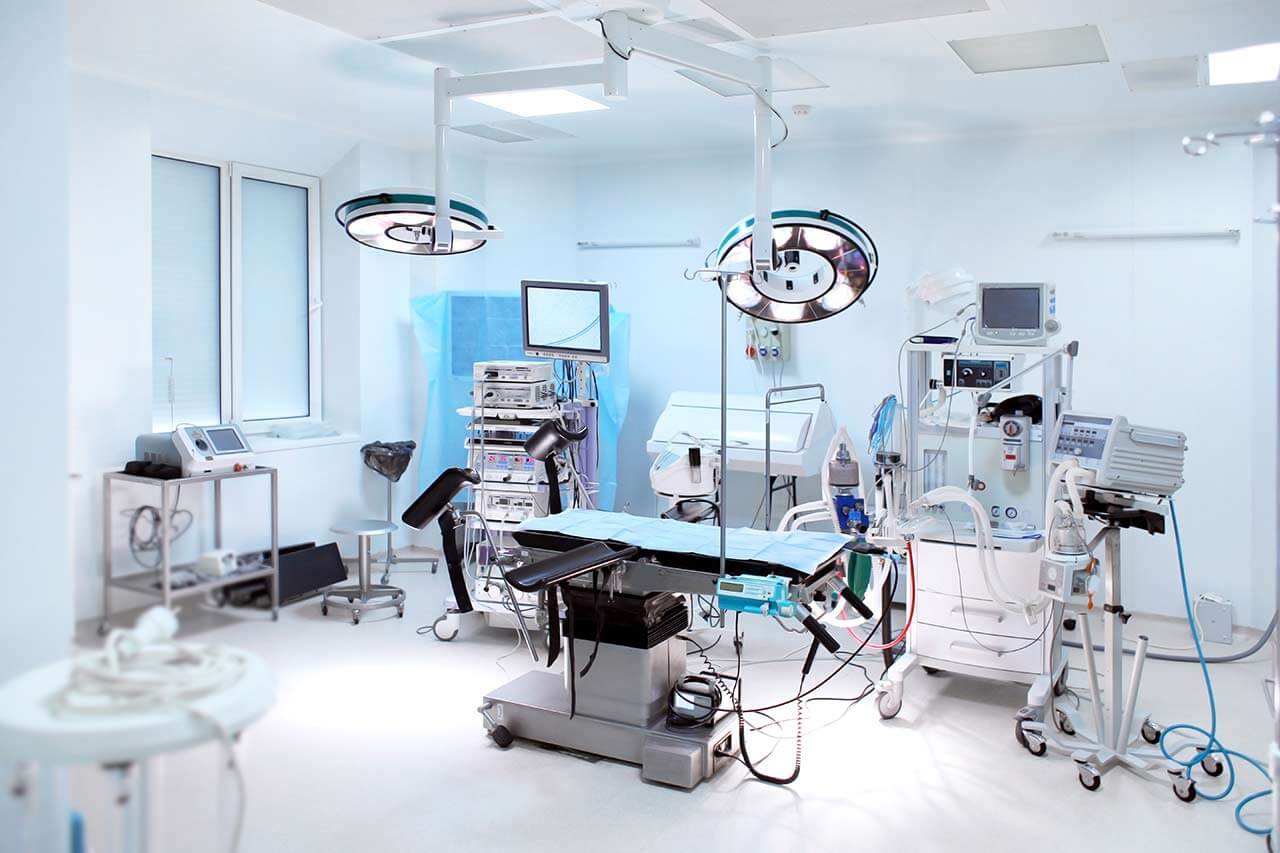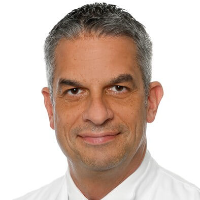
The program includes:
- Initial presentation in the hospital
- Clinical history taking
- Evaluating the available medical reports
- General clinical examination
- Urological examination
- Laboratory tests:
- Complete blood count
- Biochemical analysis of blood
- Inflammation indicators (CRP, ESR)
- Indicators of blood coagulation
- Tumor markers, PSA
- Ultrasound scan of the urogenital system
- CT scan/MRI of the abdomen and pelvis
- Preoperative care
- Removal of prostate tumor metastases with a gamma probe
- Consultations of related specialists
- Symptomatic treatment
- Cost of essential medicines
- Nursing services
- Control examinations
- Stay in the hospital with full board
- Accommodation in 2-bedded ward
- Recommendations regarding further treatment
Indications
- Confirmed prostate cancer with suspected metastasizing
How program is carried out
During the first visit, the physician will conduct a clinical examination and go through the results of the available examinations. After that, you will undergo the necessary additional examination, such as the assessment of liver and kidney function, ultrasound scan of the abdominal and pelvic organs. Based on the results, the physician will determine the number and localization of metastases, and plan the upcoming intervention.
On the eve of the intervention, you will receive an injection of radioactively labeled PSMA. PSMA is the substance that binds to the smallest prostate cancer metastases in the lymph nodes and other tissues. The radioactive label will allow the surgeon to find all the metastases during the operation.
Removal of prostate tumor metastases with a gamma probe starts with general anesthesia. After anesthesia, the surgeon makes small incisions through which he inserts endoscopic instruments, a gamma probe and a video camera into the pelvic cavity and abdominal cavity. The gamma probe detects the lymph nodes affected by metastases by a radioactive label, and the surgeon removes them endoscopically. The video camera continuously transmits a three-dimensional image of the operating field in 12-fold magnification to the monitor.
As the surgeon sees the operating field in multiple magnification, he preserves the nerve endings and large blood vessels. This significantly reduces the surgical risks. The gamma probe, in turn, allows detecting and removing all metastases, which minimizes the risk of prostate cancer recurrence.
After the completion of the operation, you will be transferred back to the ward, under the supervision of the attending physician and nursing staff. Due to the minimal invasiveness of the operation and the short duration of general anesthesia, you will not need to stay in the intensive care unit for a long time.
Finally, the attending physician will evaluate the results of control examinations, schedule the date of discharge from the hospital and give you detailed recommendations for further follow-up and treatment.
Required documents
- Medical records
- PSA blood test
- MRI/CT scan (not older than 3 months)
- Bone scintigraphy (if available)
- Biopsy results (if available)
Service
You may also book:
 BookingHealth Price from:
BookingHealth Price from:
About the department
The Department of Nuclear Medicine at the University Hospital Duesseldorf offers the full range of diagnostics and treatment with radioactive substances. It conducts many scintigraphic examinations, ranging from the diagnostics of the thyroid gland and skeleton to amino acid metabolism studies in brain tumors and metabolic studies in other malignant tumors. The department has at its disposal a specialized outpatient clinic for the diagnostics and treatment of thyroid diseases. The department is headed by Prof. Dr. med. Frederik Giesel.
Along with several traditional gamma cameras, the department has two SPECT cameras, each of which is equipped with several detectors. The diagnostic capabilities are also complemented by the very latest techniques, for example, positron emission tomography (PET). This method is one of the most informative, because using it the doctor can see a complete picture of glucose metabolism in cancer, cardiac, neurological and psychiatric diseases.
The service range of the department includes:
- Diagnostics and treatment of thyroid diseases
- Radioiodine therapy for treating tumors, in particular, thyroid tumors
- Diagnostics of coronary heart diseases and complications after myocardial infarction
- Scintigraphy
- Thyroid and parathyroid scintigraphy
- Scintigraphy to detect oncopathology
- Whole-body scintigraphy
- Radioactive gallium scintigraphy
- Somatostatin receptor scintigraphy with octreotide
- MIBG scintigraphy
- Scintigraphy using cancer embryonic antigen (CEA)
- Scintigraphy in heart diseases
- Myocardial scintigraphy
- Radionuclide ventriculography
- Brain scintigraphy
- IBZM brain scintigraphy
- Brain perfusion scintigraphy
- Cerebrospinal fluid scintigraphy
- Dopamine transporter scintigraphy (FP-CIT)
- Kidney scintigraphy
- Kidney tubular scintigraphy
- Glomerular kidney scintigraphy
- Static kidney scintigraphy
- Scintigraphy of the blood system
- Determination of the bleeding source
- Schilling test
- Scintigraphy with labeled red blood cells
- Leukocyte scintigraphy
- Scintigraphy of the gastrointestinal tract
- Esophageal scintigraphy
- Stomach scintigraphy
- Salivary gland scintigraphy
- Lymphatic scintigraphy
- Lung scintigraphy
- Liver scintigraphy
- Spleen scintigraphy
- Positron emission tomography
- Other diagnostic and treatment methods
Curriculum vitae
Prof. Dr. med. Frederik Giesel heads the Department of Nuclear Medicine at the University Hospital Duesseldorf. He also holds a position as a Visiting Professor at Osaka University in Japan. He has also worked as a Visiting Professor at Stanford University in the USA and Yonsei University in South Korea.
Prof. Giesel graduated from the Universities of Mainz and Heidelberg in Germany, then worked for some time at the National Institutes of Health Bethesda, USA. Dr. med. Frederik Giesel completed his residency at the University Hospital Heidelberg and the German Cancer Research Center (DKFZ). At the same time, he trained at the National Institutes of Health, Bethesda, and Stanford University, USA. During his residency, he also underwent training and earned a Master of Business Administration degree from the Frankfurt School of Finance and Management. After board certification and habilitation, Prof. Giesel received an additional specialization in nuclear medicine at the University Hospital Heidelberg.
Prof. Frederik Giesel founded the first integrated seminar series "Virtual Anatomy and Pathophysiology" at Heidelberg University. He has published more than 230 scientific papers in print and online publications. In close collaboration with Prof. Haberkorn's Research Group, the specialist developed the FAP ligand at the University Hospital Heidelberg.
Clinical Interest
- PSMA PET/CT for prostate cancer diagnosis.
- Imaging diagnostics of oncologic diseases.
Research Interests
- Translational molecular imaging of malignant tumors.
- PSMA PET.
- PET with FAP (fibroblast activation protein) ligand.
- Development of new cancer targets.
Photo of the doctor: (c) Universitätsklinikum Düsseldorf
About hospital
According to the authoritative Focus magazine, the University Hospital Duesseldorf ranks among the top Germany hospitals!
The hospital is an excellent example of a combination of high-quality health care, research and teaching activities. With more than 50,000 inpatients and about 300,000 outpatients every year, the hospital is one of the largest and most prestigious medical institutions in Germany and Europe.
Modern, safe and sparing diagnostic and therapeutic methods guarantee effective treatment of various diseases and their consequences. All therapeutic processes are based on an interdisciplinary approach, which provides comprehensive medical care and optimal treatment result. Obviously, one of the key roles in the successful clinical practice of the medical institution is played by a highly qualified medical personnel, which consists of the best world-class doctors. The hospital also has a special advantage due to the structured equipment with the innovative medical technologies.
The hospital presents almost all fields of modern medicine. Special attention should be given to such focuses as oncology and hematology, stem cell transplantation, neurosurgery and neurology, urology, obstetrics and gynecology, hepatology, kidney transplantation, vascular surgery, cardiac surgery, pediatric surgery, pediatric oncology, etc.
In addition to the outstanding quality of medical services, the hospital guarantees each patient an attentive care, friendly atmosphere, as well as sensitive and respectful attitude.
Photo: (с) depositphotos
Accommodation in hospital
Patients rooms
The patients of the University Hospital Duesseldorf live in comfortable single, double and triple rooms. The patient rooms are made in bright colors and modern design. The room furnishing includes an automatically adjustable bed, a bedside table, a wardrobe, a telephone, a multimedia device (TV, radio, Internet access), a table and chairs for receiving visitors. To use the phone and multimedia device, the patient should have a special chip card, which can be purchased at the reception. In the pediatric departments multimedia device can be used for free.
Meals and Menus
The patients of the hospital are offered a varied, tasty and healthy diet. Every day there are three menus to choose from for adults and four menus to choose from for children, while it is possible to develop an individual menu. When pre-ordering, the international patients may have dishes of various cuisines of the world, for example, Asian and African cuisine. If a patient needs a diet in accordance with the clinical indications, he will be provided with a special diet menu, including drinks.
Every day, the nurses inform the kitchen workers about the patient wishes using an electronic data processing system. Immediately before serving food, there are printed special cards, which indicate for which patient this or that dish is intended.
Also, the hospital houses a cafeteria with a rich selection of delicious, healthy dishes, snacks and drinks.
Further details
Standard rooms include:
Religion
Christian priests are available for the patients at any time. Representatives of other religions may be requested at any time.
Accompanying person
Your companion may stay with you in your room or at a hotel of your choice during the fixed program.
Hotel
You may stay at the hotel during the outpatient program. Our employees will support you for selecting the best option.
The hospital offers a full range of laboratory tests (general, hormonal, tests for infections, antibodies, tumor markers, etc.), genetic tests, various modifications of ultrasound scans, CT scans, MRI and PET / CT, angiography, myelography, biopsy and other examinations. Treatment with medications, endoscopic and robotic operations, stereotaxic interventions is carried out here, modern types of radiation therapy are also used. The hospital offers patients all the necessary therapeutic techniques.
- Dermatosurgery
- Skull base surgery
- Gastric bypass and bandage
- Removal of lung metastases
- Interventions on the spine
These are skin cancer (including melanoma), head and neck tumors, pathological changes in the chest (including funnel chest), obesity, liver diseases, HIV and other infectious diseases, varicose veins, aortic aneurysm, carotid artery stenosis, joint diseases and other pathologies.
- Dermatology
- Oncology
- Otorhinolaryngology
- Endocrinology and diabetology
- Orthopedics and traumatology
Over 800 highly qualified physicians work at the hospital.
